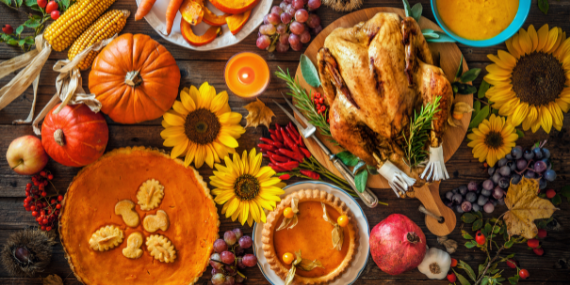Are you taking a trip this year and celebrating Thanksgiving, Christmas, or the holidays with your grown kids and their families? Are you meeting the family, including everyone from your parents to your kids and perhaps some grandkids, in some incredible location? Or is everyone coming to your house to feast?
Either way, don’t let that trip you’re taking be a guilt trip. Holidays are not about stressing what you can or can’t eat, counting calories, or doing an extra workout to burn some of the extra calories you’ll be eating. Instead, the holidays are a time to enjoy your family, food, and fun. But what about your intermittent fasting strategies during the holidays?

We are preparing meals that we don’t make any other time of the year, and you might be looking forward to the special stuffing your daughter-in-law makes or the pie that Aunt Jane will bring.
The time between Thanksgiving and New Year’s is the most challenging time of the year to stick to your hard-earned health and wellness goals. The trouble is not the actual holidays. Thanksgiving day is only one day. It’s the days between where we might think since you didn’t stick to your routine, it’s okay to blow the rest of the year and restart in January. Unfortunately, you might end up gaining 5 – 10 lbs during that time without even noticing.
This year I want you to stop feeling guilty and instead stick with my tips and strategies and continue to see progress in your intermittent fasting efforts without feeling deprived.
Get on the WAITLIST for the Pursue Your Spark Blueprint NOW!
It’s not about being perfect and instead, let’s think about moving forward with progress. You may also enjoy my blog: 5 Tips For a Strong and Lean Core Over 50. I share with you why a strong and lean core is something everyone can achieve, no matter what size or age.
5 Easy Intermittent Fasting Strategies For The Holidays

1. Don’t skip your workouts.
Let’s be honest when we have guests or when we travel, we tend to skip our workouts because we feel that we don’t have enough time to do it all. Exercise is a great way to reduce stress. If you’re suddenly thrown in with everyone in the family (the ones you like and others that are not your cup of tea), tensions will rise. So instead, plan your workout times. It doesn’t have to be time-consuming or bound to a piece of equipment or location. Need some ideas? Follow some of the videos on my YouTube Channel or take everyone on a walk, run, play a game of soccer (or any other game) that gets everyone moving and will put a smile and some sweat on everyone’s face.

2. Don’t be shamed
Some family members may know you practice intermittent fasting, while others may not. Those who don’t know that you’re fasting often don’t understand why this is a good idea. They tend to tempt you with treats, extra pieces of pie, more food than you want on your plate, or give you the “why would you want to starve yourself” line. Don’t let them deter you from your goals. You don’t have to justify why you’re fasting; perhaps if you don’t even mention it, it’s not a topic.
On the other hand, if you keep getting pressure, let them know that you don’t eat during certain times because you’re not hungry, and you’ll wait until the next meal instead of eating the standard afternoon cheese dip or snack.

3. Focus on intuitive eating
Don’t plan what you won’t eat; eat until you’re 80% full or a little more because the holiday food is so delicious. Listen to your body and the good habits that you have established already. Remember that Intermittent Fasting is NOT a diet, and you can eat from all food groups no matter how they are prepared, but you might want to choose the least unhealthy version of what’s offered. For more tips, check out my blog: How Can I Stop My Food Cravings? Is There Hope?

4. Be mindful of alcohol
Fasting or drinking on an empty stomach is never a good idea. So instead, you can drink alcohol but in moderation and time it with your “eating window.”
Don’t forget that alcohol contains calories; more than most other macronutrients:
- Carbohydrates: 4 calories per gram
- Protein: 4 calories per gram
- Alcohol: 7 calories per gram
- Fat: 9 calories per gram
During Intermittent Fasting, you’re trying to limit insulin production and keep your blood sugar levels as even as possible, but drinking alcohol impacts insulin levels. Some research indicated that alcohol causes insulin to decrease, which in theory, would be a good thing if you want to lose weight. But on the other hand, some studies show that alcohol negatively affects the liver and insulin resistance.
There are pros and cons to drinking alcohol, and when consumed in moderation, alcohol can decrease the risk of several chronic diseases like heart disease, stroke, dementia, and diabetes.
But there are also some side effects. For example, drinking alcohol can cause cancer, liver disease, obesity, and high blood pressure. But it’s also one of the foods that cause inflammation that can cause other diseases.
Whatever you choose to do during the holidays and beyond is your choice, but know that most forms of alcohol contain sugar that spikes your insulin levels, making you more likely to crave more sugar. Plus, alcohol contains calories that add up to weight gain and belly bloat. Drinking alcohol lowers your inhibitions and can make fasting much more challenging.
The National Institutes of Health recommends that women stick to one or fewer drinks per day, and men should consume no more than two drinks per day.

5. Drink more water
The strategies you have learned in the Pursue Your Spark Blueprint are still valid during the holidays. One is to stay completely hydrated, drinking at least 10 – 15 glasses of water daily.
Most holiday meals have higher fat content and more calories, salt, and sugar. To help flush out some of those toxins, keep a water bottle close by and continue to drink water as much as possible. If you are tempted to eat food outside your fasting window or are not hungry (see #3) but are urged to eat, start drinking water first before dipping into the food. You might still eat more than you’re accustomed to, but you might eat less.
If you’re drinking alcohol, drink 1 glass of wine and then one glass with water, sparkling water, flavored water, and water with a slice of lemon or any other type of water you prefer.

Remember that intermittent fasting is flexible, practical, and straightforward by nature, and that doesn’t change during the holidays. So use Intermittent fasting as your secret weapon during the holidays to stay healthy and not gain weight. Stick to the strategies that have worked for you so far and follow as many of them as you can.
Final words of encouragement
Finally, get back on track as soon as you can, and don’t wait until January 1st. You don’t have to feel deprived during the holidays because you can eat and drink what you want but be smart about it. Intermittent fasting is NOT a diet but a lifestyle.
